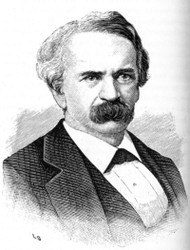Excerpt on Alfred S. Patton from Ministers of the PBA
5th Jan 2022
Alfred Spencer Patton: b. Dec. 25, 1825, Wrentham, Suffolk, England; d. Jan. 12, 1888,. . . Brooklyn, N.Y.; came to America as a child with his family, settling in Phila., where they became members of the First Presbyterian Church; as a young man, “Alfred witnessed baptism at the Tenth [Baptist] Church and was deeply impressed;” he adopted Baptist principles and was baptized by J. H. Kennard (q.v.), uniting with Tenth Baptist, Phila.; entered Hamilton Literary and Theological Institution, 1844; after grad., he spent some months in Europe; received honorary A.M., Columbian College, Washington, D.C., 1856, D.D., Madison University, 1865; m. Elisabeth Kennard ( -1899), . . . lic. 1846, Tenth Baptist, Phila.; pastor, First Baptist, West Chester, Pa., Feb. 7, 1848 (ord. Mar. 2, 1848, Phila.)-Apr. 5, 1851, First Baptist, Haddonfield, N.J., (called spring) 1851-Nov. 1854, when he resigned (effective Dec. 17th, but he continued on until early 1855), First Baptist, Hoboken, N.J., Jan. 1855-1860, Roxbury, Mass., 1860-1861, Watertown, Mass., (called Mar. 25, 1861) May 1861-July 1864, while also serving as chaplain, Massachusetts Senate, 1862-1863, pastor, Tabernacle Baptist, Utica, N.Y., July 1864-June 30, 1873; removed to Brooklyn, N.Y., 1873, where he became editor of The American Baptist, an anti-slavery journal, whose name he later changed to The Baptist Weekly, 1873-1888; Patton was the author of The Hero Missionary; or A History of the Labors of the Rev. Eugenio Kincaid (New York, 1858), 312 pp., The Losing and Taking of Mansoul; or Lectures on the Holy War (Boston, 1859), 286 pp., and The Nation’s Loss and its Lessons. An Occasional Discourse on the Assassination of President Lincoln (Utica, N.Y., 1865), 18 pp. “Among his last utterances were: ‘I wish I could preach a sermon on love, it abides.’ Being reminded that he had often done so, he replied, ‘Yes, but now I understand it.’ Just before the end, by his request, his children sang,

